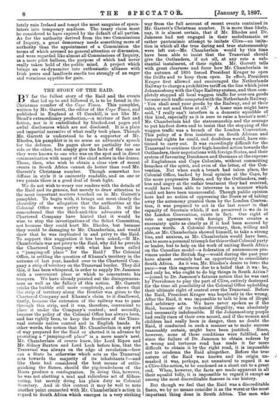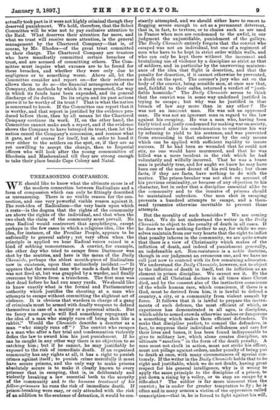STORY OF THE RAID.
BY far the fullest story of the Raid and the events that led up to and followed it, is to be found in the Christmas number of the Cape Times. This pamphlet, written by Mr. Garrett, the editor of the Cape Times, and published in England at 61 Cornhill, is not like Mr. Stead's extraordinary production,—a mixture of fact and fiction, nor is it embellished by blacked-out pages and awful disclosures which are not disclosed. It is a plain and impartial narrative of what really took place. Though Mr. Garrett is understood to be a supporter of Mr. Rhodes, his pamphlet is in no sense an advocate's speech for the defence. Its pages show no partiality for one side or the other, but simply give the facts of the case as they were known to one who was on the spot and in direct communication with many of the chief actors in the drama. Those, then, who wish to obtain a clear view of recent events in South Africa cannot do better than read Mr. Garrett's Christmas number. Though somewhat too diffuse in style it is eminently readable, and on one or two points there is a good deal of fresh light.
We do not wish to weary our readers with the details of the Raid and its genesis, but merely to draw attention to the most important matters touched on in Mr. Garrett's pamphlet. To begin with, it brings out most clearly the absurdity of the allegation that the authorities at the Colonial Office were privy to the Raid. It will be remembered that the thick-and-thin advocates of the Chartered Company have hinted that it would be wise to stop the investigations of the Select Committee, not because they could hurt Mr. Rhodes, but because they would be damaging to Mr. Chamberlain, and would show that he was implicated in and privy to the Raid. To support this suggestion it has been asked,—If Mr. Chamberlain was not privy to the Raid, why did he provide the Chartered Company with what has been called a. "jumping-off place" for the Raid ? The Colonial Office, in settling the question of Khama's territory in the autumn of last year, handed over to the Chartered Com- pany a strip of territory on the Transvaal border. They did this, it has been whispered, in order to supply Dr. Jameson with a convenient place at which to concentrate his troopers. We have already pointed out the disingenuous- ness as well as the fallacy of this notion. Mr. Garrett pricks the bubble still more completely, and shows that the strip of territory along the frontier was given to the Chartered Company and Khama's claim to it disallowed, firstly, because the extension of the railway was to pass through this strip, and it was, therefore, convenient to place it under the Company's control; and secondly, because the policy of the Colonial Office has always been, and has rightly been, to keep the frontiers of the Trans- vaal outside native control and in English hands. In other words, the notion that Mr. Chamberlain in any sort of way prepared for the Raid or abetted it in advance by providing a "jumping-off place" is a mere mare's nest. Mr. Chamberlain of course knew, like Lord Ripon and Mr. Sidney Buxton and Lord Loch before him, that the Transvaal was always on the edge of revolution—how can a State be otherwise which acts as the Transvaal acts towards the majority of its inhabitants ?—and like them had considered the best means of extin- guishing the flames, should the pig-headedness of the Boers produce a conflagration. In doing this, however, he was not abetting a mad and ridiculous act of filibus- tering, but merely doing his plain duty as Colonial Secretary. And in this context it may be well to note another point connected with Mr. Chamberlain's action in regard to South Africa which emerges in a very striking way from the full account of recent events contained in Mr. Garrett's Christmas number. It is more than likely, nay, it is almost certain, that if Mr. Rhodes and Dr. Jameson had not engaged in their melodramatic or rather pantomimic attempt to imitate Clive—an imita- tion in which all the true daring and true statesmanship were left out—Mr. Chamberlain would by this time have been able to insist that the Transvaal should give the Outlanders, if not all, at any rate a sub- stantial instalment, of their rights. Mr. Garrett tells with great clearness and force how Mr. Chamberlain in the autumn of 1895 forced President Kruger to open the Drifts and to keep them open. In effect, President Kruger first allowed and encouraged the Netherlands Railway to charge a prohibitive tariff on the line which joins Johannesburg with the Cape Railway system, and then com- pletely stopped all local waggon traffic for over-sea goods because such traffic competed with the Netherlands Railway. You shall send your goods by the Railway, and at their rates, or not send them at all.' A lesser man might have said, 'I really can't interfere in a domestic squabble of this kind, especially as it is sure to raise a hornet's nest.' Mr. Chamberlain had the statesmanship and the courage to put his foot down and to insist that the stopping of the waggon traffic was a breach of the London Convention. This policy of a firm insistence on South African and. Imperial rights he could, and doubtless would, have con- tinued to carry out. It was exceedingly difficult for the Transvaal to continue their high-handed action towards the Outlanders, their negotiations with foreign States, and their system of favouring Dutchmen and Germans at the expense of Englishmen and. Cape Colonists, without committing breaches of the spirit, and. even of the letter, of the Con- vention. But when such a breach had taken place, the Colonial Office, backed by local opinion at the Cape, by the more progressive Boers, and by the Outlanders, rest- less and angry at the unfair treatment they had received, would have been able to intervene in a manner which could. not have been unsuccessful. Though public opinion here had no notion of oppressing the Boers or of taking away the autonomy granted them by the London Conven- tion, it was prepared to act in the last resort in that capacity of Suzerain which, if not preserved in wo ds in the London Convention, exists in fact. Our right of veto on agreements with foreign Powers creates a suzerainty quite as clearly as if it had been secured by express words. A Colonial Secretary, then, willing and able, as Mr. Chamberlain showed himself, to take a strong line, and anxious, as Mr. Chamberlain would have been, not to score a personal triumph for this or that Colonial party or leader, but to help on the work of uniting South Africa on the Canadian model—a federation of autonomous pro- vinces under the British flag—would during the past year have almost certainly had an opportunity to consolidate South Africa. As it was, Mr. Rhodes's desire to force the pace—was this eagerness due to a belief that it we. I he, and only he, who ought to do big things in South Africa? —joined to Dr. Jameson's fatuous notion that he was cast by Providence to play the part of Clive, entirely destroyed. for the time all possibility of the Colonial Office upholding their ultimate right of control over the Transvaal. Before the Raid, President Kruger was hopelessly in the wrong. After the Raid, it was impossible to talk to him of illegal and arbitrary acts. We have never spoken as if the Raid, because of its technical illegality, was absolutely and necessarily indefensible. If the Johannesburg people had really risen of their own accord, and if the women and children had really been in danger, then no doubt the Raid, if conducted in such a manner as to make success reasonably certain, might have been justified. Since, however, none of these conditions were fulfilled, and since the failure of Dr. Jameson to obtain redress by a wrong and. tortuous road has made it far more difficult to obtain it by the right road, it is impossible not to condemn the Raid altogether. Before the true nature of the Raid was known and its origin un- masked it was, perhaps, not unnatural to regard it as a Clive-like action, to be condoned as a short cut to a great end. When, however, the facts are made apparent in all their squalid folly, it is impossible to regard it except as among the most discreditable fiascoes in our history.
But though we feel that the Raid was a discreditable fiasco, we by no means consider it as the worst or the most important thing done in South Africa. The men who actually took part in it were not highly criminal though they deserved punishment. We hold, therefore, that the Select Committee will be wise not to pay exclusive attention to the Raid. What deserves their attention far more, and what we trust will receive more attention, is the general management by the Chartered Company—that is, of course, by Mr. Rhodes—of the great trust committed to their charge. The Chartered Company are trustees who have manifestly committed certain breaches of trust, and are accused of committing others. The Com- mittee must inquire what excuses are to be found for these breaches, and whether they were only due to negligence or to something worse. Above all, let the Committee consider and report on—for their reference allows them to do so—the financial arrangements of the Company, the methods by which it was promoted, the way in which its funds have been expended, and its general discharge of its duties. Do its origin and its past actions prove it to be worthy of its trust ? That is what the nation is concerned to know. If the Committee can report that it is worthy, and that report is justified by the evidence pro- duced before them, then by all means let the Chartered Company continue its work. If, on the other hand, the Committee cannot make such a report, and if the evidence shows the Company to have betrayed its trust, then let the nation cancel the Company's concession, and resume what it gave, not of course for itself, but in order to hand it over either to the settlers on the spot, or, if they are as yet unwilling to accept the charge, then to Imperial officers who will look after the young communities of Rhodesia and Mashonaland till they are strong enough to take their place beside Cape Colony and Natal.















































 Previous page
Previous page